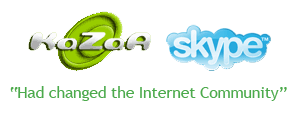Skype and Kazaa had changed the net. How?
I remember Niklas Zennstrom, the mastermind behind Kazaa and Skype, when i read about him at BBC Click Online and discussed how his two inventions came about, and how broadband and wireless devices are shaping his vision for the future.
Niklas Zennstrom's software inventions had provoke an explosion in file swapping technology in the world and still there are few people in the world who can claim to have invented something that captured the imagination of hundreds of millions of people.
But this man has done it twice.
 It all started while he was working for the European low cost Telco Tele 2 in the mid-1990s, where he met his friend and colleague Janus Friis, his co-founder of Skype and Kazaa, the world’s most downloaded software, responsible for the most popular software that underpins the FastTrack file sharing network protocol.
It all started while he was working for the European low cost Telco Tele 2 in the mid-1990s, where he met his friend and colleague Janus Friis, his co-founder of Skype and Kazaa, the world’s most downloaded software, responsible for the most popular software that underpins the FastTrack file sharing network protocol.It was on March 2001, when the duo had created Kazaa and were cashing in on the file-swapping boom kicked off by Napster, a music file P2P portal.
What made Kazaa different is that it avoids a centralised lists of what people were swapping. This arm's length approach kept it, and other file-sharing services like it, out of trouble. The result was an explosion of music swapping, and movies soon followed with the widespread take-up of broadband.
Humble beginnings
Kazaa is estimated to have been downloaded onto more than 140 million machines. But while Zennström thought it had great potential from the start, he did not know exactly what people would use it for - be it shareware for software, video or anything else. They have made it as open as possible without having knowledge on how the public would used it.
Then after months, it was became a battle cry of internet downloaders and had started using it more and more and became the most downloaded software on the internet.
And as Napster was already in the position, he and Friis thought there was no chance of Kazaa competing in the music arena.
He says: "It was more a technical proof of concept that it was possible to transfer files between two end users rather than going through servers."

But something about Kazaa caught the public's imagination to set it above all the other file-sharing programs available.
There were two reasons why Kazaa struck gold. "One was that it had a very new type of technology that took care of all the problems, and everything worked. They have packaged this in a user interface that was very easily used, so that the user could use the software, search for something, download it and it just worked."
Online hurdles
Despite the instances of illegal file-sharing that have resulted from the popularity of such networks, Zennström does not admit to a guilty conscience. He considered it as "Ultimately reat things." He just compares the problems faced by the new medium to similar issues of the past. Just like radio stations started playing music the record companies started suing radio stations. They thought now that people could listen to music for free, who would want to buy a record in a record shop? But I think we all agree that radio stations are good stuff.
Kazaa website screen grab
Kazaa was not originally intended for the music market and the VCR did the same thing, the movie industry thought nobody would ever watch movies any more. "But that technology enabled the movie industry to make much more revenue. The single largest revenue source for the movie industry is videos."
Kazaa has also been criticised for including malware and spyware as a way of getting some money back. This is a usual trend for any developers wants to monetized just to keep the project going and it's a usual practice. But Zennström agrees that the amount of adware in programs like Kazaa, and some of the other file-sharing networks, is "way too much" because "It destroys the user experience" he added.
What they did with Kazaa initially is to limit the number of advertisements, which he says "wasn't that bad in the beginning", but they grew over time.
"That's something that me and Janus learnt as an experience, and with Skype we did not have any type of advertisements whatsoever."
And so with the latest venture of Zennström and Friis , they have learned from the experience. When they launched Skype in 2003 they have started to discourage advertisers and, just like Kazaa, it exploits a new and emerging technology.
It was powered by a emerging protocol called VoIP (Voice over Internet Protocol), it lets people use the internet to make free or very cheap phone calls around the world.
It is a free download, and the service is free too, so it is no big surprise that Skype now has the largest number of users in the VoIP arena and has topped 100 million downloads, all with minimal amounts of advertising.
This is a disruptive technology that shifts the internet industry. It really created a new situation for everyone to adapt. This technology enables people to communicate directly and it undercuts a lot of revenues of the big phone companies, who have been using outdated technology. It is something that will prevail because it's ultimately very beneficial for end users - consumers and businesses.
But it is not completely free since you still need to have a computer and an internet connection, preferably broadband.
Careful pricing model
So how can Skype monetized and lets say, have to get back their investment for their inventions and effort. A price modeling was initiated via a small fraction of users purchase for additional services, such as the capability to call from Skype to the telephone network or vice versa.
Not having to make money from every user is not a new idea, Zennström emphasises.
"It is very similar to companies like Google and other internet companies. When you go and search on Google you don't pay for that. But sometimes you click on an advert and Google makes money on that.
"It's the same thing with Skype. Some users are paying for services, but not everyone."
With this phenomena in VoIP, he believes that the losers out of this new structure will be the Telcos who do not understand that there is a change going on. He believes Skype will take away revenue from phone calls, which is the bulk of the revenue for phone companies.
"This is a disruptive technology that shifts the industry", he says.
"That will go away in the future - all phone calls will be free. That's obviously an issue for them.
"On the other hand, Skype, just like Kazaa and other software, are encouraging people to buy broadband connections.
At present, less than half of the population has broadband but not in the Philippines. Telcos here who still have control of the internet bandwidth has the final say of the pricing. And this can be their devilish move to slowdown the proliferation of VoIP tools for free calls.
Skype is a long-term project and they have just started, and if you compare the number of people using Skype to the number using a telephone network around the world, we're still just starting. You and me has to have that experience first before we can finally conclude that telephone is finally over.
Comments